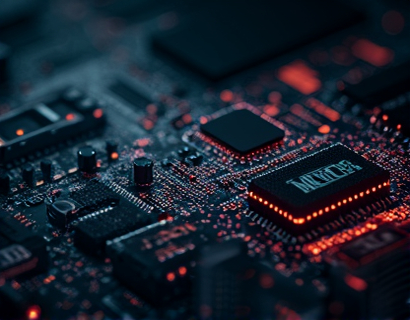Decentralized Business Transactions: Empowering Secure Interactions with Advanced dApp Solutions
In the rapidly evolving landscape of digital commerce, the shift towards decentralized solutions has become a pivotal trend. This transformation is driven by the need for more secure, transparent, and efficient business transactions. Decentralized applications, or dApps, are at the forefront of this revolution, offering a new paradigm for interactions in the digital space. This article delves into the world of decentralized business transactions, exploring how advanced dApp solutions are empowering users to connect, collaborate, and conduct transactions with unprecedented security and transparency.
The traditional centralized models of commerce have long been criticized for their vulnerabilities, including data breaches, lack of transparency, and high transaction costs. These issues have spurred a significant shift towards decentralized alternatives. Decentralized applications leverage blockchain technology to create peer-to-peer networks where no single entity has control, thereby reducing the risk of manipulation and enhancing trust among users. This shift is particularly appealing to tech-savvy entrepreneurs and businesses seeking decentralized solutions that can streamline their operations and enhance security.
One of the key features of decentralized applications is their ability to facilitate secure and transparent interactions. Blockchain's inherent properties, such as immutability and transparency, ensure that all transactions are recorded in a tamper-proof ledger. This means that once a transaction is confirmed and added to the blockchain, it cannot be altered or deleted, providing a high level of security and trust. For businesses, this translates to reduced fraud risks and increased confidence in transactions, which is crucial for fostering long-term relationships and growth.
Decentralized applications also offer enhanced privacy and control over data. In a centralized system, user data is often stored on servers controlled by the platform, making it vulnerable to breaches and misuse. In contrast, dApps allow users to maintain control over their data, deciding who can access it and under what conditions. This not only protects user privacy but also complies with stringent data protection regulations such as GDPR, making dApps an attractive option for businesses operating in regulated industries.
The architecture of a typical decentralized application involves several key components. At the core is the blockchain network, which serves as the decentralized ledger for all transactions. Smart contracts, self-executing contracts with the terms directly written into code, play a crucial role in automating and enforcing business logic. These smart contracts ensure that transactions are executed only when predefined conditions are met, eliminating the need for intermediaries and reducing transaction costs. Additionally, decentralized storage solutions like IPFS (InterPlanetary File System) are used to store and retrieve data in a distributed manner, further enhancing the resilience and scalability of the application.
For businesses, the benefits of adopting a decentralized approach are manifold. First and foremost, decentralized applications reduce dependency on central authorities, which can be a single point of failure. This decentralization not only enhances security but also increases the resilience of the system against attacks and outages. Moreover, the transparency provided by blockchain ensures that all transactions are visible and verifiable, fostering trust among business partners. This trust is essential for building robust and sustainable business relationships, especially in cross-border transactions where regulatory and cultural differences can pose significant challenges.
Another significant advantage of dApps is their ability to streamline business processes. Traditional business transactions often involve multiple intermediaries, such as banks, legal firms, and brokers, each adding layers of complexity and cost. Decentralized applications automate these processes through smart contracts, reducing the need for intermediaries and speeding up transaction times. For instance, in supply chain management, dApps can track the movement of goods in real-time, ensuring transparency and accountability at every stage. This not only improves efficiency but also helps in quickly identifying and addressing issues, such as delays or quality concerns.
The user experience in decentralized applications is designed to be intuitive and user-friendly, despite the underlying complexity of blockchain technology. Advanced dApp solutions focus on creating seamless interfaces that guide users through the transaction process without requiring extensive technical knowledge. This accessibility is crucial for widespread adoption, as it enables businesses of all sizes to leverage the benefits of decentralized commerce. Moreover, the integration of user-friendly features such as wallet management, transaction history, and real-time notifications enhances the overall user experience, making decentralized transactions as convenient as their centralized counterparts.
Security remains a top priority in the development of decentralized applications. While blockchain technology provides a robust foundation, additional layers of security are implemented to protect user assets and data. Multi-signature wallets, for example, require multiple approvals before a transaction can be executed, adding an extra layer of security. Furthermore, regular audits and security assessments ensure that the application remains resilient against emerging threats. For businesses, this means that their digital assets and sensitive information are better protected, reducing the risk of financial losses and reputational damage.
Scalability is another critical aspect of decentralized applications. As the number of users and transactions grows, the system must be able to handle increased load without compromising performance. Advanced dApp solutions employ various techniques to ensure scalability, such as sharding, where the blockchain is divided into smaller, more manageable parts, and layer 2 solutions, which process transactions off the main blockchain to reduce congestion. These innovations enable dApps to support a large number of users and transactions, making them viable for widespread adoption in various industries.
The impact of decentralized commerce extends beyond individual businesses to the broader economy. By reducing transaction costs and eliminating intermediaries, dApps can democratize access to financial services, particularly in underserved regions. This inclusivity can drive economic growth and empower small and medium-sized enterprises (SMEs) to compete on a global scale. Additionally, the transparency and traceability of decentralized transactions can enhance regulatory compliance, reducing the burden on businesses to manage complex reporting requirements.
Despite the numerous advantages, the adoption of decentralized applications is not without challenges. One of the primary hurdles is the technical complexity associated with blockchain and smart contracts. Many businesses lack the expertise to develop and maintain their own dApps, necessitating partnerships with specialized developers or the use of user-friendly platforms. Moreover, regulatory uncertainty remains a significant barrier, as governments worldwide are still grappling with how to classify and regulate decentralized transactions. However, as the ecosystem matures, these challenges are expected to be addressed through education, standardization, and clearer regulatory frameworks.
Looking ahead, the future of decentralized commerce is promising. The integration of emerging technologies such as artificial intelligence, the Internet of Things (IoT), and 5G networks is set to further enhance the capabilities of dApps. AI can optimize smart contract execution, predict market trends, and enhance user experiences through personalized services. IoT devices can enable real-time tracking and automation in various industries, from logistics to manufacturing. With 5G providing faster and more reliable connectivity, the seamless execution of decentralized transactions will become even more feasible, paving the way for a truly interconnected digital economy.
In conclusion, decentralized business transactions represent a transformative shift in the way businesses operate in the digital age. Advanced dApp solutions offer a secure, transparent, and efficient alternative to traditional centralized models, empowering users to connect and collaborate with unprecedented ease. As the technology continues to evolve and mature, the potential for decentralized commerce to reshape industries and drive economic growth is immense. Embracing these innovations is not just a strategic advantage but a necessity for businesses aiming to thrive in the future of digital commerce.










































